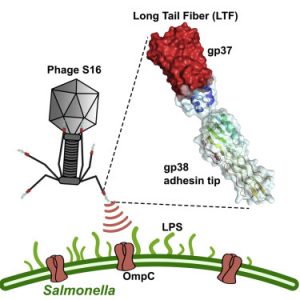Diets rich in minimally processed foods are associated with numerous health benefits, in part, due to their diverse, natural microbiota. However, antimicrobials, such as chlorine and peracetic acid (PAA), that are used to address food safety concerns may damage the natural microflora of fresh produce.
 One promising approach for targeting pathogenic bacteria in foods without impacting the normal food microbiota are bacteriophages. In this study, we observed that combinational treatment of conventional antimicrobials (PAA and chlorine) and bacteriophages, specifically the Salmonella‐targeted preparation SalmoFresh, retained the bactericidal effectiveness of individual interventions, and in some cases, achieved substantially increased efficacy. Additionally, the bacterial microbiomes of farm fresh and organic produce were less affected after phage treatment compared to PAA and chlorine.
One promising approach for targeting pathogenic bacteria in foods without impacting the normal food microbiota are bacteriophages. In this study, we observed that combinational treatment of conventional antimicrobials (PAA and chlorine) and bacteriophages, specifically the Salmonella‐targeted preparation SalmoFresh, retained the bactericidal effectiveness of individual interventions, and in some cases, achieved substantially increased efficacy. Additionally, the bacterial microbiomes of farm fresh and organic produce were less affected after phage treatment compared to PAA and chlorine.
Finally, our study revealed that resistance rates against SalmoFresh were relatively minor and unaffected by the stresses introduced after chemical washes and/or bacteriophage treatment.
Treatment of fresh produce with a salmonella-targeted bacteriophage cocktail is compatible with chlorine or peracetic acid and more consistently preserves the microbial community on produce, 10 January 2020
Journal of Food Safety
Zachary D. Moye, Chythanya Rajanna Das, Jeffrey I. Tokman, Brian Fanelli, Hiren Karathia, Nur A. Hasan, Patrick J. Marek, Andre G. Senecal, Alexander Sulakvelidze
https://doi.org/10.1111/jfs.12763
https://onlinelibrary.wiley.com/doi/abs/10.1111/jfs.12763?af=R
